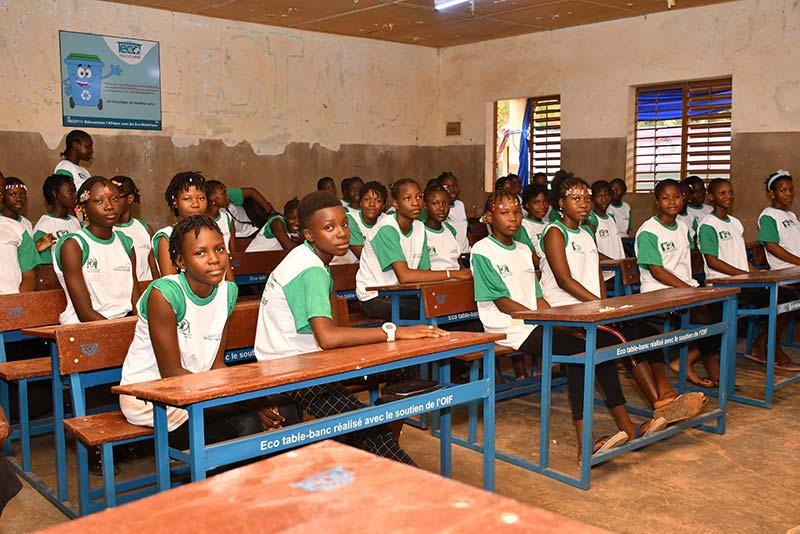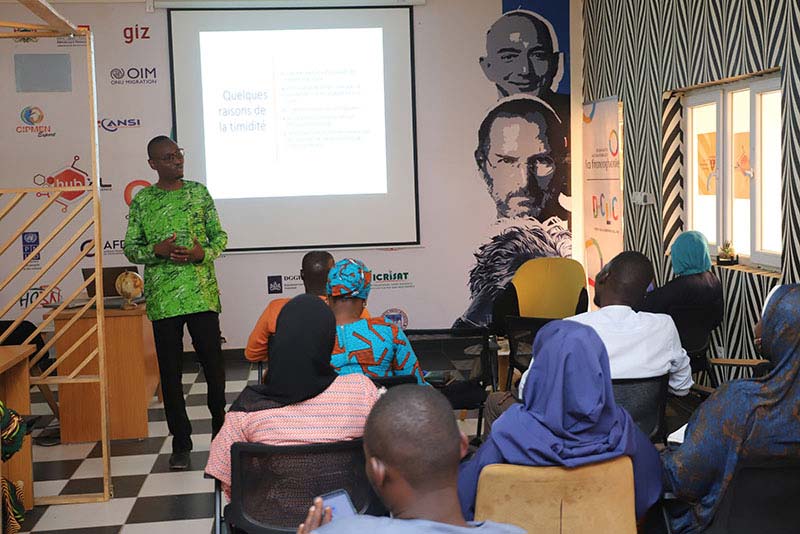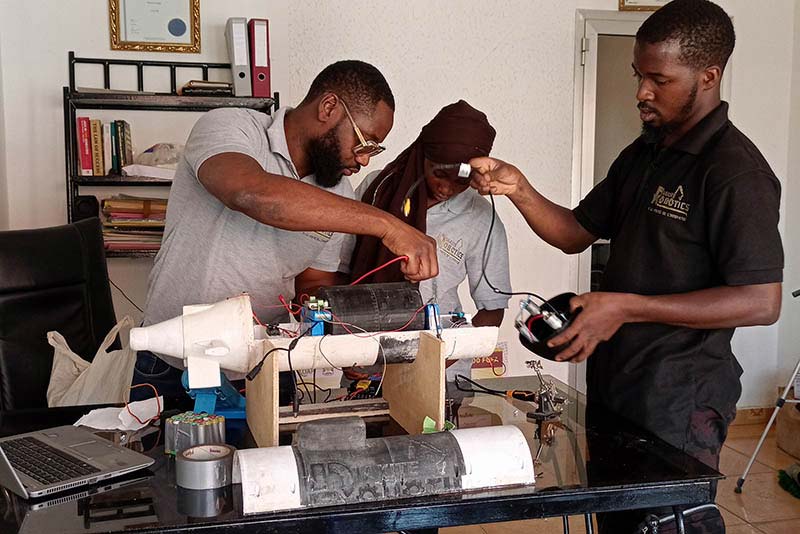Editor’s note: This is the second story in a two-part series about investment opportunities in the Sahel. The first story, on agribusiness, was published in March 2022.
By Olivier Monnier and Abdoul Maiga
Tired of seeing plastic waste littering the streets of Ouagadougou, the capital of Burkina Faso, engineer Calvin Tiam took matters into his own hands.
With the help of Burkinabé and French research institutes, Tiam developed a technique for making furniture, roofing, and beacons from recycled polyethylene plastic packaging.
"It’s both an ecological and economical solution," said Tiam, who founded Toiture Ecologique et Economique (TECO²) in 2018. "Recycled plastic is a better insulating material than corrugated iron, which is widely used in the region but is ill-adapted to our Sahelian climate."

School furniture made from plastic waste by TECO² in a school north of Ouagadougou, the capital of Burkina Faso. Photo courtesy: TECO².
Tiam’s major supporter was Investisseurs et Partenaires (I&P), an impact investment firm dedicated to small and medium-sized enterprises (SMEs) in sub-Saharan Africa. It gave €60,000 ($65,000) in seed funding to Tiam’s start-up.
I&P is part of a growing group of investors and incubators that recognize the need and demand to support start-ups across the five countries that make up the G5 Sahel ― Burkina Faso, Chad, Mali, Mauritania, and Niger ― to help entrepreneurs create and grow their businesses.
An emerging start-up ecosystem
Despite a difficult business environment in the Sahel, the region is a breeding ground for innovative start-ups. From Mauritania to Chad, a new generation of entrepreneurs is emerging with fresh solutions to the challenges affecting their countries and communities.
Start-up support organizations are sprouting, such as the incubators La Fabrique in Ouagadougou, Impact Hub in Bamako, and CIPMEN in Niamey. Each supports local start-ups through training and business coaching.

Entrepreneurs receiving training at the Incubator Center for Small and Medium Enterprises in Niger (CIPMEN). Photo courtesy: CIPMEN
In Mali, the number of entities supporting entrepreneurship increased to 24 as of 2019 from four in 2015. The country’s first Angel Business Network ― “Mali Angels” ― was established in 2019 and has provided early-stage financing to two start-ups to date.
And then there’s I&P. Two years ago, I&P launched I&P Acceleration in Sahel, a 10 billion CFA francs ($16.5 million) seed-funding program backed by the European Union. It aims to finance 300 start-ups such as TECO² in the Sahel region and surrounding countries by 2023.
TECO² is using the funding and technical assistance from I&P to increase its production capacity, secure its raw material supply chain, and strengthen its sales, marketing, and management systems.
Growing focus on start-ups
The growing interest in the Sahel’s start-up scene comes as governments in the region are also recognizing the importance of empowering entrepreneurship as a strategic path to economic and social development.
This includes Mali, whose former government drafted a start-up act with measures and tax incentives to stimulate innovation and seed funding. Mauritania and Niger are also considering introducing similar legislation.
All hope to replicate the success story of neighboring Senegal, which was in 2019 the first country in sub-Saharan Africa to pass a law aimed at making it easier for start-ups to emerge. With $353 million raised in 2021, Senegal has become a top destination for tech venture capital on the African continent, according to Partech, an investment platform for tech and digital companies.
“Even if it is still nascent, the start-up ecosystem in the Sahel is growing quite rapidly,” said Raphaël Dumont, investment manager focusing on seed-funding at I&P. “More and more people have a strong entrepreneurial spirit and interesting business ideas but struggle when it comes to actually launch their start-up and scale up.”
That’s where start-up incubators and early-stage investors can play a role.
Building capacities
Despite their passion and creativity, entrepreneurs in the Sahel face a myriad of challenges, including a lack of technical support, skills, and access to finance. They also struggle with a lack of adequate digital infrastructure and poor digital connectivity, especially in rural areas.
For Tiam in Ouagadougou, financing wasn’t his most immediate problem. He said that lack of training and technical assistance were his main challenges when starting TECO².
"Finding the right coaches and organizations to guide me and help me fine-tune my project was a real struggle," he said.
Structures such as start-up incubators aim to address some of these barriers by offering non-financial assistance to entrepreneurs to help them refine their business models, develop their networks, and seek funding.
In Mauritania, Zeinebou Abdeljelil co-founded in 2014 Hadina RIM TIC, the country's first ever Information and Communications Technology (ICT) incubator.
The incubator, which organizes start-up pitch competitions such as the MauriApp Challenge and Marathon de l’Entrepreneur, has since supported more than 100 projects in the fields of digital, livestock feed production, natural compost, and solar energy equipment.
"When we started our activities, the start-up ecosystem in Mauritania was practically non-existent. Since then, a real dynamic has built up, even if there’s still a lot to be done,” said Abdeljelil, who is president of Hadina RIM TIC.
“There is a need to build the capacity of entrepreneurs in Mauritania, whether it is in the ideation of their projects, in the financial and day-to-day management of their start-ups, or in building their resilience to shocks," she said.
In Niger, the Centre Incubateur des Petites et Moyennes Entreprises (CIPMEN) was created in 2013, through a collaboration between public and private actors.

Nafissatou Noura, founder of Umm Manal, a catering service in Niamey, received technical support and seed funding from CIPMEN, a start-up incubator in Niger, to grow her business. Photo courtesy: Umm Manal
With seven branches across the country, the incubator now has more than 150 start-ups in its portfolio, and the companies it supports created more than 1,000 jobs in 2021, according to Rouffahi Koabo, its CEO.
“We don't yet have unicorns like in the Kenyan or South African ecosystems, but we have some great success stories that we are proud of because they are generating jobs,” Koabo said, citing start-ups operating in the food economy, e-commerce, manufacturing, and media sectors.
To enable the emergence of start-ups with a regional dimension, the CIPMEN initiated in 2017 the creation of Sahel Innov, a network of incubators operating in eight West African countries and Djibouti.
Access to finance
Many start-ups in the Sahel face the classic "valley of death" period, the gap between the time when the entrepreneur's own resources from family and friends ― known as "love money" ― run out and when the company is viable enough to attract investment, said Alexandre Laure, a World Bank senior private sector specialist and regional expert.
"Due to the fragility of the Sahel, the insufficiency argument still persists,” said Laure. “As a result, innovative start-ups and SMEs operating in the region are facing very basic problems, including a significant financing gap."
That’s an issue that Abdoulaye Diakité in Bamako knows all too well.
In 2014, fresh from Kingston University in London, the engineer founded Diakité Robotics, a pioneering mechatronics engineering company in Mali. To launch his business, he used his savings and borrowed 5 million CFA francs ($8,300) from his father.

Abdoulaye Diakité, founder of Diakité Robotics, a mechatronics engineering company in Mali, working with his employees in his Bamako workshop on pioneering engineering projects. Photo courtesy: Diakité Robotics
"Access to finance is really a drag for entrepreneurs," Diakité said. "Banks only lend to rich people, and ask for guarantees that are impossible to obtain.”
By winning hard-fought contracts to design traffic light controllers and secure the Radisson Blu hotel in Bamako after the 2015 jihadist attack, Diakite was able to overcome this challenge, quickly generate money to reinvest in other projects, and hire five more engineers.
Today, his company boasts an annual turnover of $130,000 and is developing ambitious projects, including a prototype submarine for use in the Niger River, an autonomous electric scooter, and 3D-printed bionic hand and shin prostheses.
Having an Impact
But not all entrepreneurs in the Sahel can replicate Diakité's experience. Most need external financial support to get their start-up off the ground.
That’s why the funds that are trailblazing and supporting the Sahel’s early-stage start-ups with seed funding are essential to enable the emergence of more entrepreneurs.
The I&P-EU's Acceleration in Sahel fund, for example, is providing interest-free loans ranging from $3,000 to $65,000 to help address the financing needs of companies during their incubation and acceleration phases.
Spread over a six-month to two-year period, the funding ― paired with technical support tailored to the needs of each start-up ― is used to support working capital needs, prototyping or market testing, equipment purchases, or to prepare the company for future financing.
To provide financial support to the start-ups it incubates, the CIPMEN in Niger has developed, with partners such as the French Embassy in Niger and the International Organisation for Migration (IOM), pre-seed and seed funds worth a total of 250 million CFA francs ($400,000).
"These funds really helped me grow my business," said Nafissatou Noura, founder of Umm Manal, a catering service in Niamey, who was granted loans from 2 to 5 million CFA francs ($3,200 to $8,000). "I was able to buy equipment, refrigerators and freezers, and eventually rent my own premises with a fully equipped kitchen."
I&P also notes that its efforts are having an impact. Less than two years after its launch, the Sahel initiative has shown encouraging results: 10 jobs per year have been created in each company financed and the program has a repayment rate of around 70 percent, a figure that exceeds expectations, according to Dumont.
And entrepreneurs are thankful.
"We are flooded with demand,” said Dumont. “There is a huge market that needs be addressed but only a few structures like us offering seed financing. We need more partners willing to take risks and work with us to finance these essential activities.”
Published in May 2022
